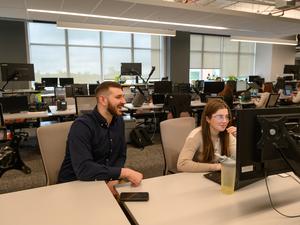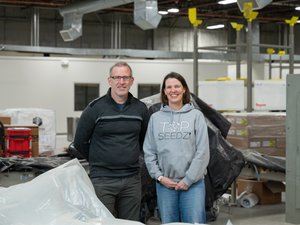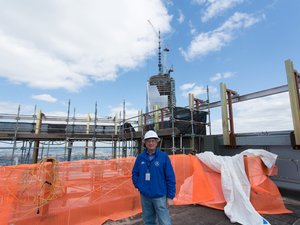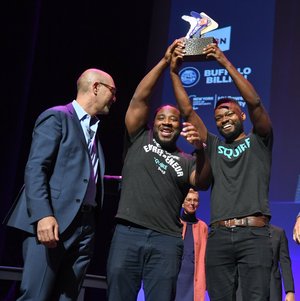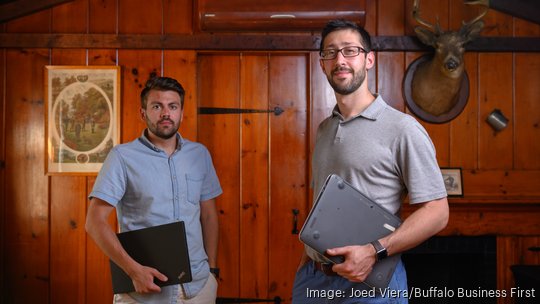
Each year that co-founders Alex Scalzo and David Longhini did annual planning for their business, they asked themselves: Are you willing to slide all of your metaphorical chips back to the middle of the table?
The answer was yes for years as Empodio grew its business and team.
But early last year, they made the final decision to close the business, despite having a customer pipeline and money in the bank to operate. In short, the startup — which helped companies scale using a Salesforce platform — accomplished what it aimed to do, and now its team is moving on.
“The normalization of what it really means to own and build something and to stop building something and move in another direction are both things that we don’t talk about a lot,” said Scalzo, who was COO.
He’s still in Buffalo working remotely as a Salesforce practice director at K2 Partnering Solutions, a consultative technology solution. Meanwhile, CEO Longhini is pseudo-retired, living cheaply and traveling “until an ambitious project calls.”
Over the year-long closing process, the co-founders helped its clients find new partners and remaining employees find new jobs, according to the business’ Linkedin post announcing the closure. Empodio had about 15 team members between staff and contractors.
The entrepreneurial journey of scaling a business
Buffalo residents Scalzo and Longhini launched Empodio in June 2019 to help companies implement a specific Salesforce product called Field Service Lightning, which at the time was projected to earn $100 million in revenue the year prior.
But by the second half of 2020, the co-founders recognized they had to pivot.
“Alex and I had a very successful business selling ourselves, but making the transition to a business that sells its services was going to take some time,” Longhini told Business First in May 2021. “Around August or October, we said ‘OK, this isn’t working out the way we want.”
The firm transitioned from a subcontractor to a company that works directly with one of the world's leading technology companies. Salesforce teams came to Empodio with clients looking to buy Field Service, and they closed the deal together.
In the process, Empodio went from “profitable to very profitable,” Longhini said in 2021. But more importantly, it had established a scalable business model that could accelerate along with Field Service. Longhini then expected to double the company's team – to 8 to 10 people – that year.
The startup ranked at No. 63 on Business First’s 2021 largest Buffalo technology companies list. The business, then located at 56 Congress St., Buffalo, had four employees.
Over its four years in business, Empodio led 40 projects for clients and had over 25 advisers, consultants and partners. Last year was the startup’s most profitable year, Scalzo said.
Why did Empodio close?
The co-founders' decision came down to their personal desires, their take on the future of the marketplace and thinking of their team.
At the start of Empodio, Scalzo said that Longhini is a huge learner who wanted to be a business owner and discover how to run a business. Scalzo himself saw it as an opportunity to work with Longhini in an industry he knew well.
But four years into the business, there wasn’t as much learning left to do, and they didn’t want to put the company’s growth before their own lives or their employees’ lives.
“I’m a very 'volunteers, not hostages' kind of person,” Scalzo said. “I always told my team, ‘I’ll tell you if I think your growth was slowing down.’ I did feel like that for some of my key employees and contractors.”
The pair also saw more great tech solutions entering their market and wondered about the future evolution of that Salesforce marketplace that they had no control over.
They explored merging with another company but ultimately decided to try something new, according to the Linkedin post.
“There was a lot of seeing where we are able to put ourselves, other people and see that growth slow down for the team, see the market and… I just don’t know if it makes sense to put all these chips back in the middle.,” Scalzo said.
The process of closing a startup
Informal conversations about potentially shuttering started in late 2022. By January 2023, the formal decision was made, but Empodio took about a year to fully shutdown.
“As we closed, David and I had only two real goals: One, be really profitable because we spent time spending money to expand, experiment,” Scalzo said. “Two, handling everything we could with grace.”
They told staff around March of last year and helped employees find new jobs. By September 2023, Empodio’s clients knew, and the team helped them find new partners for their projects.
Throughout the business’ lifecycle, the co-founders boostrapped and never took on outside investment. The co-founders each grew their personal finances “linear to the type of roles” they’d have had otherwise, if not about 10% more, according to Scalzo.
He could easily see Longhini having another business. For him, personally, it’d have to be the right opportunity and time in his life to jump in again.
“I think more than anything else, I’m super proud of the growth for us as owners and leaders, of my team and their career path and journeys and own personal lives as well,” Scalzo said. “It’s just kind of a chapter of a book rather than a book closing itself.”


